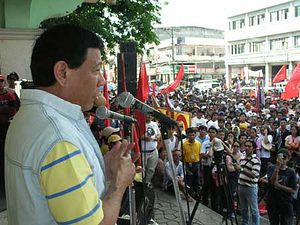Philippine President Rodrigo Duterte, fresh out of his headline-grabbing visit to China last week, will meet with Japanese Prime Minister Shinzo Abe soon. The Diplomat‘s Mina Pollmann has a helpful rundown of the challenges Abe will have to navigate in dealing with Duterte. Both leaders lead countries with treaty alliances with the United States, but Duterte’s anti-American rhetoric will no doubt give Japan pause — as will his intent to pursue economic rapprochement with China after at least four years of chilly Sino-Philippine ties.
Interestingly, ahead of his trip to Japan, Duterte — as he is by now known to do — delivered some particularly interesting comments on how he sees Japan playing a role in the South China Sea. As my colleague Prashanth Parameswaran observed earlier this week, Duterte’s rhetoric, while anti-American, has a tinge of an “Asia for Asians” bent. Accordingly, he’s quite fond of Japan and sees a productive role for the country in a range of Asian disputes.
Speaking on Saturday in Davao City in the Philippines, Duterte suggested a role for Japan to participate in multilateral deliberations on the South China Sea. “To the Chinese government, I said, well if that is the thing, that is what is in your mind because that is also my stand, we will find the day to talk about it, only on the issue of the South China Sea and no topic at all. It could be bilateral, it depends on the development, it could be multilateral and that would include Japan. Those are what I suggested, in the future,” he said.
“My talks with the Japanese government particularly the Prime Minister would be on economic operation and of course shared interest. Now, the most important thing there is the shared interest is really about the South China Sea,” he added.
There’s a lot to digest here. First, what Duterte describes above would be absolutely inimical to China’s preferred approach to dealing with the South China Sea disputes, which is bilaterally with each claimant independently. Not only does Beijing see little use for multilateralism, it certainly sees no role for Japan in the South China Sea. In fact, repeated warnings from China this year have described an expanding Japanese role in the region — where Tokyo has growing defense partnerships and interest in naval exercises — as a “red line” of sorts.
All of this underlines a broader point that Prashanth made in his piece, which is that Duterte is still early on in his administration and remains mostly disinterested and inexperienced in navigating the details of complex foreign affairs issues like the South China Sea. Indeed, that he cranked up his anti-American rhetoric to 11 while in Bejing and is now purporting to discuss multilateralism in the South China Sea partly suggests that he may simply be calibrating his message for different audiences and consumers.
We’ll shortly find out where Abe and Duterte come out on the South China Sea dispute, but remember, despite last week’s headlines of a great ongoing rebalance in Asia as Manila pivots away from Washington and toward Beijing, China may find that it too has to deal with the Philippine president’s rhetorical vagaries.

































